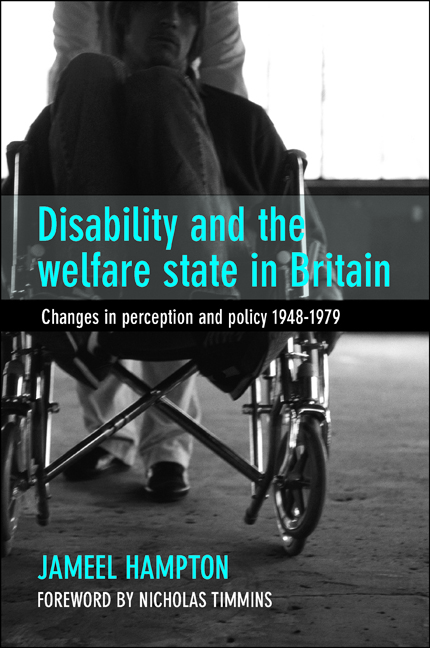Book contents
- Frontmatter
- Contents
- List of tables
- List of acronyms
- About the author
- Acknowledgements
- one Introduction
- two The old regime: provision for disabled people before the welfare state
- three Promotional welfare, 1948–63
- four The emergence of disabled people, 1964–69
- five Cinderella of the welfare state: legislation for disabled people, 1970–72
- six The final days: disability at the end of the welfare state, 1973–79
- seven The last waltz: epilogue
- eight Conclusions
- Appendix: Ministerial periods of office
- Bibliography
- Index
seven - The last waltz: epilogue
Published online by Cambridge University Press: 01 September 2022
- Frontmatter
- Contents
- List of tables
- List of acronyms
- About the author
- Acknowledgements
- one Introduction
- two The old regime: provision for disabled people before the welfare state
- three Promotional welfare, 1948–63
- four The emergence of disabled people, 1964–69
- five Cinderella of the welfare state: legislation for disabled people, 1970–72
- six The final days: disability at the end of the welfare state, 1973–79
- seven The last waltz: epilogue
- eight Conclusions
- Appendix: Ministerial periods of office
- Bibliography
- Index
Summary
They realize at last that change does not mean reform, that change does not mean improvement. (Franz Fanon, The wretched of the earth)
How ineffective the cash benefits were was not yet realised by disabled people in 1975. The NCIP seemed to end the contributory principle and its exclusion of those disabled people unable to work. So, too, did the HNCIP in addressing the welfare of disabled women who could not work either inside or outside their homes. The welfare state's principles of compensation and insurance, as established in the National Insurance Act 1946 and the Industrial Injuries Act 1946, had been extended to include attendance and mobility: the Mobility Allowance addressed those people in immediate need, and the Invalid Care Allowance paid cash benefits to people unable to work because they were providing care for a disabled relative. The DIG gave Castle and Morris a sherry party in November – disabled people were the ‘Cinderella’ of the welfare state.
The new cash benefits had been established before serious economic crises. With inflation reaching 27 per cent in 1975, economic growth was slow and tax revenue reduced, and the Wilson government then faced increasing demands for welfare, especially because of the high unemployment at the time. Volume spending on public services ended as cash limits were imposed in November 1975. The Callaghan government then abandoned full employment, which had been the basis of the welfare state settlement: contributions therefore no longer supported benefits. And the IMF loan confirmed how unsustainable the welfare state had become in the current economic climate.
Cinderella had come to the ball too late. For disabled people, the feeling of achieving significant inclusion in the welfare state was short-lived. Callaghan dismissed Castle as Minister of Health for Social Security in April 1976, and so they lost a powerful representative within a Labour government that was now committed to restraint on expenditure.
The NCIP was largely useless to disabled people, offering no financial advancement as it was paid at the same rate as Supplementary Benefit, and only 10,000-15,000 recipients actually experienced a net gain in income. There was extremely low take-up for the Invalid Care Allowance as it was deducted from Supplementary Benefit. The HNCIP was not offered until November 1977, and there was low take-up because of the means test.
- Type
- Chapter
- Information
- Disability and the Welfare State in BritainChanges in Perception and Policy 1948-79, pp. 231 - 236Publisher: Bristol University PressPrint publication year: 2016

